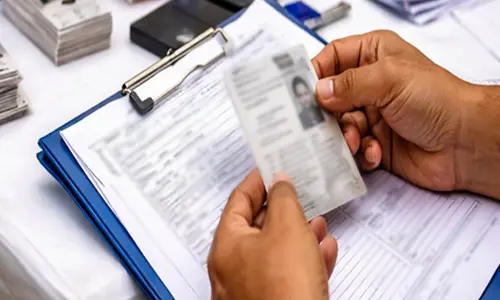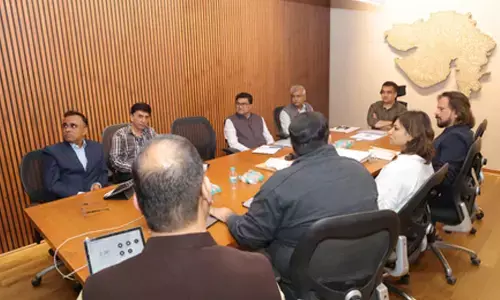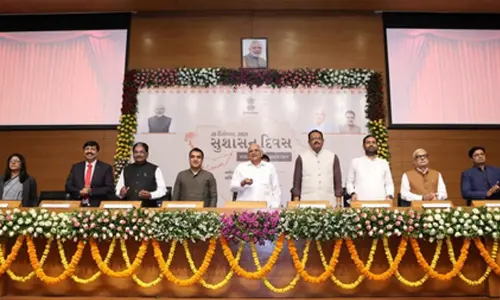What do people think?

Public opinion, or vox populi, has become such a clich� that ordinary people don’t know who these faceless, nameless, address-less characters are that keep bobbing up whenever a particular view is to be cited to buttress an argument. Do they really exist or are they created out of imagination of a speaker or a political leader who quotes ‘public opinion’ without batting an eyelid?
Public opinion, or vox populi, has become such a cliché that ordinary people don’t know who these faceless, nameless, address-less characters are that keep bobbing up whenever a particular view is to be cited to buttress an argument. Do they really exist or are they created out of imagination of a speaker or a political leader who quotes ‘public opinion’ without batting an eyelid?
If thousands of people air their views, like those done in opinion polls by reputed professional organizations on a scientific basis, giving margins for all kinds of errors, there will be little scope to doubt its veracity. If it is not done on that basis and the facts and figures are dished out of nowhere and attributed to public opinion, it does not cut much ice; on the other hand, fictitious claims can become a major source of embarrassment and lead to needless verbal battles.
Still, some love to take refuge in public opinion in an attempt to convince others that what they are saying is right and has public sanction. Even if one gives the benefit of the doubt to the speaker, there is no way to check the claims simply because, out of crores of people, a miniscule number might have said it and it can’t and shouldn’t be the basis for drawing conclusions and generalizing them as the collective will of a whole lot of people.
That’s what is happening, unfortunately, now with crowd- pullers. Numbers can be extrapolated and any Tom, Dick and Harry (one can substitute one or all the three names with Indian ones) can derive own conclusions from the statistics. Have we not seen it happening with poverty levels, ration cards and a lot of other schemes and projects involving thousands of crores of rupees? Interestingly, the ‘public’ reactions to the schemes will invariably be favourable if they come out of the leader’s mouth.
The leaderspeak was the butt of jokes when former American President George W Bush was at the helm. During the invasion of Iraq, his and White House aides’ favourite expression was ‘world opinion’ which, incidentally, was that of the US and its allies that formed the coalition forces which marched into Baghdad in 2001 to topple Saddam Hussein. How could a single country’s or its leader’s proclamation of war translate into world opinion is anybody’s guess. Despite opposition from a number of countries even at the United Nations General Assembly, the so-called ‘world opinion’ carried the day.
‘Public’ or ‘global’ opinion claims raise a fundamental question: How far is it credible; and are people not being taken for a ride? The corollary is what is the reliable and trustworthy way of collecting information about what people really think of leadership. But for the feedback one gets from people who are not lazy enough to write letters to newspaper editors expressing their opinions frankly, and surveys – not online variety since they are the most unauthentic – involving a large number of participants from different walks of life, an adoptive approach to measuring the pulse of the people is hoodwinking them.
But a novel method Norwegian Prime Minister Jens Stoltenberg has adopted may give a clue to those who are overanxious to know the pulse of the people, particularly during election time. In a Facebook video post, Stoltenberg said that he had gone incognito as a taxi driver to know how popular he was among the voters in June.
“It is important for me to hear what people really think. If there is one place where people say what they think, it’s in the taxi,” he tweeted. The video was released the other day in time to swing the September vote in his favour. Stoltenberg’s half-day taxi service around Oslo may be self-effacing but it has not helped him garner extra support if we go by the available indications. But his effort does show that he wants to acquire first-hand knowledge of his people; doesn’t matter whether he will win or lose.
In contrast, how many of our leaders will come down to earthly levels once they are elected people’s representatives? They need extra security, vehicles with beacons to keep people away from their chosen path; visits to them are strictly regulated; and hardly do they find time to see those who have voted them to power, let alone redress people’s problems. One need not necessarily go undercover as a taxi driver or a manual labourer to understand the common man’s problems; it’s enough to devote sufficient time to interact with the people and make them feel that he/she is their representative and is at their service. Lack of such assurance, not by word but by deed, makes the functioning of democracy a mockery.
If we delve into history, some rulers were said to have visited marketplaces secretly at night to hear what their subjects were talking about their governance. It was a sort of introspection that surely might have helped both the ruled and the ruler. Those were the days when the modern concept of democracy and its principles of equality and justice to all were unheard of. Individual was as important as the community.
While we are not living in a bygone age and our working systems are far more advanced and methodical, the governing methods and redress mechanisms ought to be more scientific and quicker. That is possible only when there is more people-government interaction, scrutiny and accountability. When these are lacking, none can feel the pulse of the people, even if beats loudly.
















